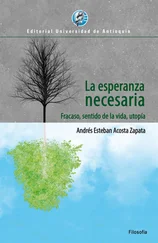“She’s going to die, Anita, you know that? Aunt Eli is.”
“Yes, she’s going to go to heaven.”
“No, not to heaven. She’s just going to die. She’s not going anywhere, she’s going to disappear. Heaven doesn’t exist.”
“Yes it does.”
“No— it doesn’t .”
Anita fell silent then. He had to force himself not to walk at his normal speed, so she wouldn’t have to run to keep up. Anita frowned a little, as though attempting to destroy something inside her and then giving up.
“Yes.”
“NO.”
Anita was an unusual little girl. Sometimes she seemed cold, as though she’d learned from the time she was a baby to absorb things without touching them at all, to go unnoticed, moving from place to place on her tiny little legs, with her birdlike expression; other times she seemed very different, moved to an almost insufferable degree by other people’s pain, and that was when she walked the way she was walking now, as though dragging something behind her, something heavy and dense and hazardous. The house smelled of talc and cheap food, like Aunt Eli. Anita cowered behind him.
“Does the house scare you?”
“Yes,” she said, “a little.”
Her candor was directly proportional to her fear. Later, when they were at the hospital, she seemed a thousand times braver than him. The second she walked into the room, she leapt to Aunt Eli’s bedside and gave her a big, noisy smooch, and it was he who hung back in the doorway as though waiting for someone to ask if he was scared.
She looked like a corpse already, Aunt Eli did. A fat, sweaty, almost yellow corpse. He’d never realized that something as simple as a change in skin tone could foretell the imminence of someone’s death with such urgency.
His father was trying to behave rationally. He made small talk, feigning upbeat confidence. Aunt Eli’s replies were nonsensical.
“No matter what you say, I’ve always thought women were better than men.”
All afternoon he acted shy and uncomfortable. When they’d been there two hours, Aunt Eli became delirious, and his father took Anita off someplace else. He stayed and watched them inject morphine, watched her face soften, watched her slowly sink into slumber looking like an obese maid who’s slogged away all day and finally gets to rest but still dreams of mops and buckets. He watched her sleep there in the hospital bed, unable to recognize her and yet fascinated. He didn’t feel queasy or lightheaded, he simply noted matter-of-factly the way she panted, as though the mere state of wakefulness consumed all of her energy and it could only be restored through sleep, as though that were the time for Aunt Eli’s body to withdraw inward. He watched as if from afar, as if intimacy were impossible with her asleep, at a set distance, as if already standing before a corpse, or a ghost. She talked in her sleep.
“As sure as the world is round.”
And fluttered a hand. Then writhed in pain. Sometimes she writhed even in her sleep. His mother started to cry. Up until that moment, he’d had a very vague idea of physical pain, and in part it was as though he’d believed it was subject to a set of rules, to certain laws. But in fact, contemplating Aunt Eli’s very apparent distress, he felt as though a certain logic had been broken. He had never before suspected that life also entailed infinite shame, and that that shame was so directly and heartlessly related to physical pain. Aunt Eli was sick, and she was trapped; it was as if her pain blocked out the world, like a sickly whirlwind, impetuous, unbearably stomach-churning. Prior to that moment, pain had seemed a sort of mental state; now it was something dirty and personal, like a festering, a pointless catastrophe.
She regained consciousness briefly, for fifteen minutes or so. And said, “All this needs to be cleaned up.”
And then, staring at him, she said, “Tell him that I’m right.”
“Who?”
And to his father, as he walked back into the room, “I never sleep with fools, I cannot abide fools.”
His father replied, a bit melodramatically, Eli, please !
There were six days left of summer, and Aunt Eli held on for three, during which they set up a rotation so that she was never alone and there was also always someone with Anita, who after the second day was no longer allowed back in the hospital room. Anita would ask him afterward to tell her everything he’d seen at the hospital each day, every little detail. He did the best he could and got the feeling, as he spoke, that his words were dropping down into a deep, almost bottomless pit. Anita would stare at him gravely, as though attempting to take everything in through her gaze. It seemed strange, sometimes, that this was all happening with summer at the height of its splendor. At the hospital, with his aunt, it was all so intense that her body almost seemed like a place . He didn’t know how else to explain it — it was as if Aunt Eli’s body were a place and he went inside it. It was sort of like making your way through an unfamiliar darkness, where you had to move in tentatively, maybe leave a trail — delicate little scraps of something — and there were echoes, and echoes of echoes, and flashes and horrifying discoveries. One of those mornings, her eyes were open, staring at the ceiling, and she wasn’t saying anything, just wincing every time she felt a jolt of pain. He’d been alone with her for a while, and then an aide walked in.
“She’s not speaking today.”
The aide replied, “Some people are like that — the more they suffer, the less they complain. They just lie there with their eyes open, silent.”
When she left, after cleaning the room, he took out his cell phone and, holding it at very close range, took a picture of Aunt Eli. It was a bizarre picture. Her eyes were open, staring straight at him. Her hair was messy, her lips slack and swollen from the pain, and in the photo there was a softness to her skin — which was covered in purplish spots — that her real face did not possess; it was as if some milky substance had oozed from the phone’s tiny screen, filming her over. But what frightened him most about the picture was that there didn’t seem to be anything there to look at. Aunt Eli pulled a hand from beneath the sheets and reached for the phone. She wanted to see that photo. They’d just administered another dose of morphine, and yet she seemed inexplicably alert.
“If anyone loved me, this is what they’d love,” she said.
All of her gestures seemed real, all of her words seemed real, but there was no woman there. She had a look of sorrow on her face, but it vanished quickly, like a wet footprint left by a bare foot stepping on the shore.
“Give me a kiss,” she said.
But his self-consciousness made him fearful. It wasn’t the first time she’d done this. Aunt Eli was always asking to be kissed, kissed in a way he’d never kissed anyone before — not a girl, not his parents, not Anita. And he couldn’t kiss her that way, nor did he.
He saw them for the second time on one of the afternoons he was watching Anita while his parents were at the hospital — the girls. They were always in the same place, on the shore where he’d first met them four days ago with Marcos, Pablo, Tejas, and Rivero. Perhaps they did it to be more easily found, or maybe they actually liked it there, though that was hard to believe. He was with Anita at an outdoor café that looked out over the estuary; they’d each ordered an horchata with the ten euros his father had given them to treat themselves to something. They didn’t know what to do with themselves those afternoons and wandered around like a couple of adults diagnosed with heart conditions — begrudgingly, and only because the doctor had prescribed it. He recognized Duli — or Moni, or Frani, or whatever the name of the dune girl was — and she seemed to recognize him. They stared at one another for thirty seconds, until he finally looked away. Involuntarily, he blushed. There was a new girl with them this time. From a distance she looked slightly older, or bigger boned, but her movements were more childlike and uncoordinated. It took him nearly ten minutes to realize she was retarded. They were playing with her — badgering her, really — until she got worked up, and then they’d leave her be, and then five minutes later they’d get her all worked up again. She let out high-pitched squeals, and from where they were, it was impossible to tell if she were capable of any other form of expression. At one point they put an enormous floatie around her and all went into the water together, which excited her to what seemed a near-painful frenzy. He watched everything, down to her attempts to breathe. Duli or Moni or Frani kept turning back every three seconds to make sure he was still watching, but it was that girl and not her that he was really looking at. She looked like she was swimming through the world. There wasn’t a single beautiful thing about her, not even her delight. In fact, her delight may have been the thing that seemed most deranged. It deformed her face hideously, in precisely the same way a normal person’s face would be deformed by disconsolate sobbing, or hearing insufferable screeching. But she was delighted. The intensity of it couldn’t possibly last. And indeed, within a few minutes it seemed to morph into something unpleasant to both herself and the other girls, and they pulled her from the water and dried her with a towel, and she simply stood there and let them. Then she plopped, exhausted, onto the sand.
Читать дальше












